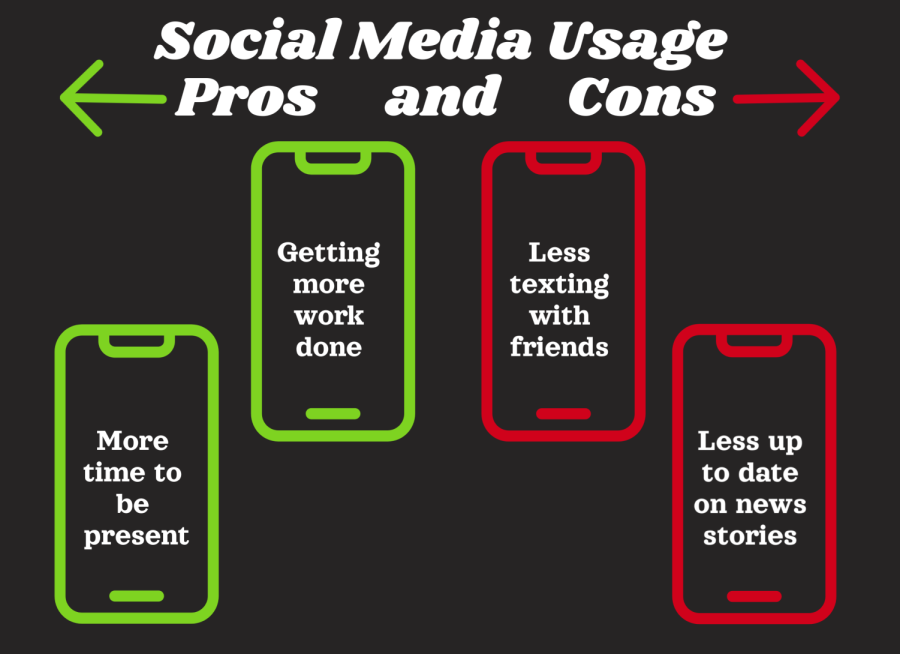Getting Rid of Social Media
What are the Pros and Cons of Social Media?
Instagram has become an outlet for many teenagers to disengage. Researchers have been trying to discover if the Instagram algorithm could affect attention span and engagement in daily routines.
Apps such as Instagam are more commonly used for only a few minutes at a time. Attention spans, or the time that a user is actively paying attention to content, have been researched to be “just about 2 seconds.” After this said time, and if the content fails in entertaining the viewer, disinterest assumes control leading to hours of mindless scrolling instead of meaningful information intake.
Certain tasks including school and reading become more difficult to focus on due to these short attention spans. According to pediatric psychologist Dr. Micheal Manos, “In the short term, [social media] could make it harder for them to concentrate in class or complete an assignment, which they think is boring.”
While scrolling through a social media feed, not much actual attention is needed. It becomes a mindless distraction, making it an easier option to resort to. Dr. Patrick Clarke, a supervising researcher at Curtin’s School of Population Health stated that “More time on social media also means less time doing other, possibly more important or more productive tasks.”
In an attempt to discover what the specific highlights and challenges of less social media time are, I decided to delete my social media and go one week without it. Here are 5 positive and 5 negative
consequences of no social media for me.
5 positive effects: With the absence of social media and the use of technology, a person is almost forced to be present 24/7.
- Meaningful Conversations: With the absence of social media and the use of technology, a person is almost forced to be present 24/7. I found that there was no ability to disengage or quickly disconnect from a conversation. On the other hand, in order to fill that gap of social media, conversations had to be made and made often, especially with family.
- Increased Productivity: Oftentimes, people forget just how much time is being spent on their phones. I discovered just how large that period of time was when I had lost the ability to access social media. With plenty more time on my hands, I could be more productive and quickly get tasks done without any interruptions or distractions.
- Time for Hobbies: With the excess amount of time I had, new hobbies could replace that large gap. On regular school days, the combination of social media and amount of homework left no room for any leisure. During this week, I found myself able to take a quick breath of fresh air, go on a nice walk, and enjoy the outdoors
- Slower Pace: Life almost seemed to slow down during this experimental week. I found that headaches and stress levels all slowly lowered. I had more space to get things done, every minute spent completing a task was productive, and there was plenty of time to also have leisure.
- Clear Priorities: Along with the loss of social media, there was a more narrowed down point of view of life that came as a result. Instead of filling my head with other people’s ideas or what my peers’ were up to, I was focused upon myself, what my priorities were for that specific evening, and my family.
5 negative effects:
- Less Communication: One of the most obvious negative effects of less social media is decreased communication with friends. Interaction with school friends specifically was limited to school only during this week.
- No Getaway: As previously discussed in the positive effects, disengagement is harder to find without social media. A quick getaway or a brief 10 minute break from an assignment is not possible. This largely depends on each person on whether or not it is a positive or negative effect.
- No News: Having less knowledge on news stories and being less up to date could be considered both a negative and positive effect. Without the constant notifications or giant headlines blaring in your face and on your phone, it is easier to miss out on that knowledge of current events and breaking news.
- Muscle Memory: An alarming observation I found was of myself picking up my phone but setting it down immediately. I already had this habit that felt like muscle memory, to pick up my phone and want to do something with it. It happened many times and very often. This disengagement that I was subconsciously seeking was never found and felt almost like an itch that could not be satisfied.
- Less Social Knowledge: Less knowledge of your favorite social media content creators or just your friends is also a result of ridding of those certain media platforms. Posts can easily be missed out on because of the constant and very frequent amount of posts being made to keep a person active on your account.
While connection with friends or family over long distances and staying up to date on current news can be positive, there can be a balance with day-to-day use of social media. Each extremity of social media use could be avoided if there was a restriction on its time limit. The pros greatly outweigh the cons in this scenario. Productivity, face-to-face personal conversations, and more time can benefit every person if they are willing to limit technology use.




